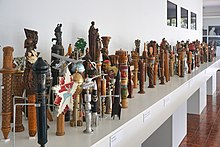Relay of Youth
 Monument to relay carriers near Partizan Stadium in Belgrade. | |
| Date | 1957–1988 |
|---|---|
| Location | Yugoslavia |


The Relay of Youth (Serbo-Croatian and Slovenian: Štafeta mladosti (Cyrillic: Штафета младости), Macedonian: Штафета на младоста, Albanian: Stafeta e Rinise) was a symbolic relay race held in Socialist Federal Republic of Yugoslavia every year. The relay carried a baton with a birthday pledge to Josip Broz Tito ostensibly from all young people of Yugoslavia.[1][2] The race usually started in Tito's birth town Kumrovec and went through all major towns and cities of the country. It ended in Belgrade at JNA Stadium on May 25, Tito's official birthday[3] and Day of Youth, a national holiday.
The relay first took place in 1945 and was formalized as a national holiday in 1957. It went on after Tito's death in 1980 and was last held in 1988.[2]
In 1987, the winning poster design for the relay caused a national scandal, as it was revealed to have been based on a Nazi propaganda poster.[1][4][5][6] The authors, the design division of Neue Slowenische Kunst, submitted the design in order to protest Tito's cult of personality, of which the relay was a major part. Along with the rising crisis of the Yugoslav state, this scandal is deemed to have significantly contributed to the decision to discontinue the Relay.
References
[edit]- ^ a b Maja Mikula. "Virtual Landscapes of Memory[permanent dead link]". Information, Communication and Society. 6(2003):169-186. (needs subscription) [dead link]
- ^ a b "Relay Baton and the Day of Youth" NSKSTATE.COM.
- ^ Although Tito's birthday was celebrated on May 25, he was in all probability born on May 7.
- ^ "Poster Scandal - Youth Day" NSKSTATE.COM.
- ^ Regina Hackett. "Slovenian art collective is adept at working politics and art". Seattle Post-Intelligencer, Friday, November 19, 2004.
- ^ Bartolj, Jaka (12 August 2014). "A Slovenian poster challenged Yugoslavia's Communist orthodoxy". Radiotelevizija Slovenija.
External links
[edit] Media related to Relay of Youth at Wikimedia Commons
Media related to Relay of Youth at Wikimedia Commons

